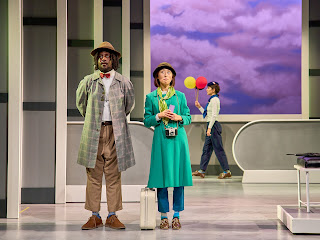Curve, Leicester
21st September 2022
‘When you shall these unlucky deeds relate,
Speak of me as I am’
Of all Shakespeare’s plays, Othello is arguably the one that has the
most pertinence in the contemporary world. Frantic Assembly grasp this notion
and bring the play bang up-to-date, accentuating the modern-day issues at its
heart in their fast-paced, expressive and surprisingly gory adaptation (first
produced in 2008, now revived in a co-production with Curve). Class, race,
sexism and territorialism simmer beneath a veneer of bogus loyalties and gang
culture, creating a pressure cooker of tension which eventually boils over in
spectacular fashion.
Director Scott Graham and co-adapter
Steven Hoggett centre the action in a run-down pub, the local haunt of a street
gang led by a battle-worn Othello (Michael Akinsulire) and his ‘lieutenant’,
Michael Cassio (Tom Gill). The opening scene sets the tone in an exciting
whirlwind of lust, violence and camaraderie (both genuine and false) in a near
wordless feat of choreography. Frantic Assembly are masters of movement and
that is demonstrated to thrilling effect here; the punches carry weight and the
fighting is fused with an often striking lyricism. The use of movement to
convey key aspects of the story is an ingenious tool, keeping the plot hurtling
forward towards that inevitable doom, where perhaps more traditional
productions could get bogged down by the wordiness of Shakespeare’s verse (I
say this as someone who loves Shakespeare!). So much of Othello and Desdemona’s
(Chanel Waddock) relationship here is played out through choreographed moments
of tenderness, passion and aggression, and by focusing on this intimacy we
invest more in the characters, making the denouement all the more tragic. I
also particularly enjoyed the collaboration between choreography and Laura
Hopkins’ set design during the scene where Iago and Roderigo (Felipe Pacheco) conspire
to get Cassio blind drunk. The walls of the set undulate in dizzying
inebriation while the actors lunge, fly and swoop through the pub, pausing only
for more shots of alcohol. At other times the walls of the pub expand and
contract, creating cinematic zoom effects, homing in on, or isolating
individual characters. Every considered detail of this production unites to
create a lean yet engrossing portrait of modern Britain.
An unnervingly still presence
amidst the frenetic revelry is Joe Layton’s Iago; a man that picks up on the
tiniest details, who calculates from shadowy corners (at one point he literally
sinks into the walls of the pub) and whispers poisonous untruths into the
expectant ears of his acquaintances. Here, the racism directed towards ‘the
Moor’ is of a very 21st Century flavour; Iago is jealous of his
prowess, both physical and sexual, and much is made of Iago’s vengeful belief
that Othello has slept with his wife, Emilia (Kirsty Stuart). The racism displayed makes us
even more uncomfortable as it holds up a mirror to the hypocrisies and everyday
prejudice that is still rife in the world today.
Similarly, as the racism of the
past is reflected in the present, Graham and co have also shone a spotlight on
the misogyny at the heart of the play. Just as Bianca (Hannah Sinclair
Robinson) is dismissed, slurred at and thrown to the ground, Emilia and
Desdemona are the victims of the most violent language and actions. The image
of Desdemona’s limp body suspended in her husband’s chokehold will haunt me,
just as Iago’s final burst of aggression towards Emilia is horrifically
shocking (and bloody). The previous scene between the women in the ladies loos
as they lament ‘these men!’ is depressingly fatalistic, as they eventually
concede to ‘let them use us well […] the ills we do, their ills instruct us so’;
just as the production creates an authentic portrait of working-class
territorial gang wars, so too does it depict the harsh reality of domestic
violence and commonplace misogyny in society today.
The cast all play their parts with
a rawness and passion that befits the intensity of the piece, and as an
ensemble they move as one, creating an electric atmosphere. Frantic Assembly
demonstrate again why they are one of the most exciting theatre companies
working today. By stripping back Shakespeare’s play to its bare bones, the
group have produced a play which is action-packed, accessible and relevant to
contemporary audiences without losing any essence of the original. I was fully
absorbed by this sordid microcosm from start to bloody end.
Othello plays at
Curve until 1st October 2022 followed by a UK tour. It then plays at
the Lyric Hammersmith from 19th January to 11th February
2023.
For full tour details please visit:
https://www.franticassembly.co.uk/productions/othello-2
 |
| Frantic Assembly's Othello. Credit: Tristram Kenton. |



